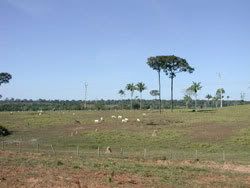Brazilian legislation to offer incentives for conversion of degraded pastures into biofuel plantations
 Quicknote bioenergy policies
Quicknote bioenergy policiesFederal member of parliament Eliene Lima (Progressive Party) is to present [*Portuguese] a proposal for legislation today that aims to offer incentives to cattle farmers and ranchers to help produce biofuels in Brazil.
According to the proposal, pasture and land owners (many of whom do not use their land to rear livestock at all) will be encouraged to plant jatropha, sugar cane and other biomass energy crops. The incentive consists of special credit and financing means that can be obtained from the Sudam (Superintendência de Desenvolvimento da Amazônia) and the BNDES (Banco Nacional de Desenvolvimento Econômico e Social).
Brazilian researchers say some 200 million hectares of pastures in the country are currently not used for productive purposes because they are degraded. This massive expanse of land can be restored by planting biofuel crops (earlier post). Eliene Lima says "On a global scale, both in Brazil as elsewhere, ethanol and biodiesel are the focus of attention. In order to manage and expand the 'boom' in biofuels and to share profits amongst key stakeholders, banks, industrial ethanol producers, manufacturers and farmers are collaborating intensively. This interest shows the market is very promising and expanding rapidly. We must now give incentives to rural producers so they can participate more in this market."
Lima adds that in 2007, Brazil will achieve its largest sugar cane harvest in its history. Estimates put it at 491 million tons. "The world is beginning to understand the importance of this potential. Brazil can supply the market and will become the global leader in biofuels."
With the incentives put forward in the legislation, all farmers including smallholders in the country are given an opportunity to help strengthen Brazil's agro-industrial base. Lima thinks the law, which guarantees access to capital, will boost the number of jobs in the sector and keep Brazil becoming more energy independent.
In order to encourage the production of biofuels that benefit small farmers, Brazil earlier introduced a policy called "Social Fuel", that offers incentives to producers who invest in and involve poor rural families in feedstock production (see our in-depth analysis of the "Social Fuel Seal" policy) [entry ends here].
 bioenergy :: biofuels :: energy :: sustainability :: ethanol :: biodiesel :: biomass :: pasture :: finance :: Brazil ::
bioenergy :: biofuels :: energy :: sustainability :: ethanol :: biodiesel :: biomass :: pasture :: finance :: Brazil ::  --------------
--------------
 Taiwan's Feng Chia University has succeeded in boosting the production of hydrogen from biomass to 15 liters per hour, one of the world's highest biohydrogen production rates, a researcher at the university said Friday. The research team managed to produce hydrogen and carbon dioxide (which can be captured and stored) from the fermentation of different strains of anaerobes in a sugar cane-based liquefied mixture. The highest yield was obtained by the Clostridium bacterium.
Taiwan's Feng Chia University has succeeded in boosting the production of hydrogen from biomass to 15 liters per hour, one of the world's highest biohydrogen production rates, a researcher at the university said Friday. The research team managed to produce hydrogen and carbon dioxide (which can be captured and stored) from the fermentation of different strains of anaerobes in a sugar cane-based liquefied mixture. The highest yield was obtained by the Clostridium bacterium.








1 Comments:
With the incentives put forward in the legislation, all farmers including smallholders in the country are given an opportunity to help strengthen Brazil's agro-industrial base. Lima thinks the law, which guarantees access to capital, will boost the number of jobs in the sector and keep Brazil becoming more energy independent.
Post a Comment
Links to this post:
Create a Link
<< Home